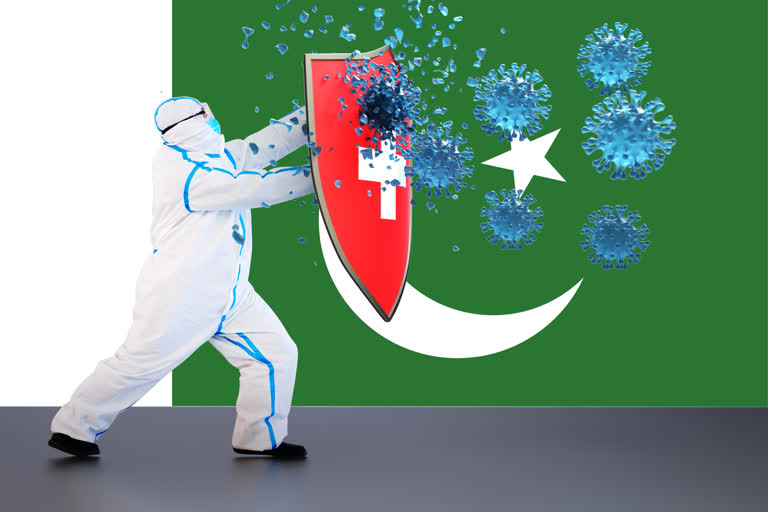A US study led by an Indian-origin researcher has found that high levels of some cytokines seen in Covid-19 patients, as part of a cytokine storm, may prevent the development of long-term immunity to coronavirus.
"By using our understanding of how two different types of immune cells normally collaborate to make the best antibodies, we were able to find a mechanism that could explain this lower-quality immune response in Covid-19 patients," said Shiv Pillai from the Massachusetts General Hospital in the US.
For the study, published in the journal 'Cell', the research team examined the spleens and lymph nodes of deceased Covid-19 patients and found a lack of germinal centres, an essential part of the durable immune response.
Germinal centres are structures induced within the lymph nodes and spleens during infection or vaccination. In them, B cells, the immune cells that produce antibodies, mature to become long-lived "memory" cells. This process, along with controlled mutations in antibody genes, allows the immune system to select for and immortalize B cells that make the best antibodies against a particular pathogen.
According to the researchers, this creates a lifelong "memory" of a pathogen which allows the body to quickly and effectively identify and attack the pathogen in the case of re-infection. Without germinal centres, there aren't enough B cells that can create a high-quality antibody response to produce long-term immunity. To form germinal centres, B cells depend on key support from another specialized type of cell called a helper T cell.
The research team showed that in Covid-19 patients, the specialized type of helper T cell does not develop, and as a consequence, B cells are not helped in the right way. The study found no germinal centres in acutely ill patients. Previous studies with infectious disease in mice have shown that high levels of cytokines, small signaling molecules unique to the immune system, can prevent the formation of these helpers T cells and therefore of germinal centres.
Large amounts of a cytokine called TNF, in particular, prevented germinal centre formation. Severe Covid-19 cases were found to have massive amounts of TNF in the location where germinal centres would normally form.
Without the formation of germinal centres, there is unlikely to be long-term memory of this virus developing from natural infections.
"It means that while antibodies may protect people for a relatively short time, a single person who recovers from the disease could get infected again, perhaps six months later, or even multiple times with SARS-CoV-2," Pillai said.
"This suggests that developing herd immunity may be difficult," Pillai added.
The findings would likely not affect vaccine-induced immunity, as vaccines do not induce cytokine storms.
Another study published last week in the same journal revealed that mild cases of Covid-19 can trigger robust memory T cell responses even in the absence of detectable virus-specific antibody responses.
COURTESY: IANS
Study Finds Why Some COVID-19 Patients May Not Develop Lasting Immunity
According to a study led by Indian-origin researchers, a high level of Cytokines is seen in COVID-19 patients that may prevent the development of long-term immunity from the Coronavirus.

A US study led by an Indian-origin researcher has found that high levels of some cytokines seen in Covid-19 patients, as part of a cytokine storm, may prevent the development of long-term immunity to coronavirus.
"By using our understanding of how two different types of immune cells normally collaborate to make the best antibodies, we were able to find a mechanism that could explain this lower-quality immune response in Covid-19 patients," said Shiv Pillai from the Massachusetts General Hospital in the US.
For the study, published in the journal 'Cell', the research team examined the spleens and lymph nodes of deceased Covid-19 patients and found a lack of germinal centres, an essential part of the durable immune response.
Germinal centres are structures induced within the lymph nodes and spleens during infection or vaccination. In them, B cells, the immune cells that produce antibodies, mature to become long-lived "memory" cells. This process, along with controlled mutations in antibody genes, allows the immune system to select for and immortalize B cells that make the best antibodies against a particular pathogen.
According to the researchers, this creates a lifelong "memory" of a pathogen which allows the body to quickly and effectively identify and attack the pathogen in the case of re-infection. Without germinal centres, there aren't enough B cells that can create a high-quality antibody response to produce long-term immunity. To form germinal centres, B cells depend on key support from another specialized type of cell called a helper T cell.
The research team showed that in Covid-19 patients, the specialized type of helper T cell does not develop, and as a consequence, B cells are not helped in the right way. The study found no germinal centres in acutely ill patients. Previous studies with infectious disease in mice have shown that high levels of cytokines, small signaling molecules unique to the immune system, can prevent the formation of these helpers T cells and therefore of germinal centres.
Large amounts of a cytokine called TNF, in particular, prevented germinal centre formation. Severe Covid-19 cases were found to have massive amounts of TNF in the location where germinal centres would normally form.
Without the formation of germinal centres, there is unlikely to be long-term memory of this virus developing from natural infections.
"It means that while antibodies may protect people for a relatively short time, a single person who recovers from the disease could get infected again, perhaps six months later, or even multiple times with SARS-CoV-2," Pillai said.
"This suggests that developing herd immunity may be difficult," Pillai added.
The findings would likely not affect vaccine-induced immunity, as vaccines do not induce cytokine storms.
Another study published last week in the same journal revealed that mild cases of Covid-19 can trigger robust memory T cell responses even in the absence of detectable virus-specific antibody responses.
COURTESY: IANS


